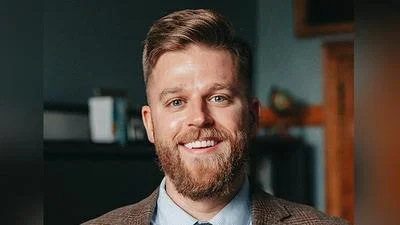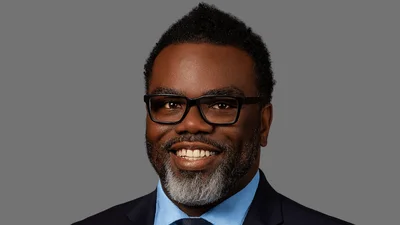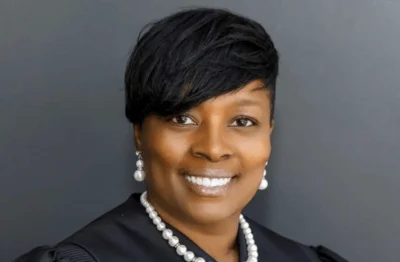Erin Bourke (left) is speaking out on behalf of hearing disabled children like her son Bobby. | Provided
Erin Bourke (left) is speaking out on behalf of hearing disabled children like her son Bobby. | Provided
Erin Bourke’s 4-year-old soon has had to overcome a lot in his handful of years.
Bobby attends St. Christina’s School on Chicago’s south side and suffers from a rare condition.
“He is missing his cochlear nerve in his left ear, which is like the rarest form of single sided deafness, like the most rarest form,” Bourke told Chicago City Wire.
Despite an early analysis noting hearing loss, Bobby wasn’t diagnosed with deafness until he was older.
Bourke said due to a misdiagnosis, Bobby’s hearing loss slipped by, adding that an earlier analysis by an audiologist bordered on “negligence” for not properly diagnosing the issue.
“They were just flat out wrong,” she said.
It wasn’t until masking began that the effects of the deafness in his left ear became more immediately noticeable.
Bobby had been able to get by with hearing in only one ear until masking stripped him of the ability to read lips, a habit he’d picked up out of necessity.
“Children who have single sided hearing loss, they have a hard time tuning out background noises because they're missing one sensory input. So if they're in a noisy environment, a noisy school classroom, it's harder for them to tune out all this background noise,” Bourke said. “And then you add a mask ... now it's a very, very difficult for him to understand language and speech.”
With masks, Bobby was struggling to hear others and even his own voice. Bourke noticed Bobby asked her to repeat herself when she was wearing mask and that he was also having trouble with understanding his teachers at school.
After the diagnosis became clear, Bobby was given a Baha implantable hearing device to assist with his hearing.
“These bars are ‘bone-anchored’ hearing devices that vibrate the skull to bring sound to the brain,” Bourke said of the Baha device. “So, you know, nothing's perfect, right? We're learning to use that.”
In November 2021, after Bobby had struggled for months amid the latest masks mandate in schools, Bourke had had enough.
“Politicians in the state want to have this one-size-fits-all mask mandate, but there is zero consideration for the hearing impaired individuals,” she said. “They are the ones that suffer the most by not being able to read people's facial expressions, to read people's lips, to hear the sound coming out of people's mouth. Clearly, because there's a mask covering the volume of their speech.”
Bobby had been doing well up until the introduction of masks, Bourke said, and she called the Archdiocese of Chicago began the application process for a mask exemption to allow Bobby some semblance of normality.
Bobby was granted an exemption himself due to his partial deafness because it is difficult for him to hear himself, a noted barrier to communication in the hearing disabled.
“You need to be able to hear your words in order to hear yourself speak right. He's also of age where he's learning to articulate right and learning new words and new syllables,” she said.
Both Bobby’s pediatrician and audiologists supported the mask exemption that was initially denied by the Archdiocese of Chicago, which oversees the school.
They are not alone among medical professionals in their support of unmasking children.
One commentator in The BMJ, a peer-reviewed British medical journal, remarked on the lack of empirical evidence that masks are effective. “When is the Medical Profession going to speak out and take action to prevent harm to child patients?” the commenter wrote.
Like Bobby, 15% of Americans 18 and older suffer from some sort of hearing impairment.
Bourke said the parents of others hearing impaired children across the Archdiocese’s schools have also complained of masks usage interfering with their disabled child’s ability to speak.
“These poor individuals who are hearing impaired, who have been suffering over the past two years, I think they need a voice,” she said. “So we're putting ourselves out there, which it makes everyone nervous, but it's for a better cause for our children who have disabilities.”
Bourke, who did not share any other information about her life outside of her experience with her son and the school system, said she felt the importance of helping disabled children was more important that being subjected to public criticism for speaking out in such a public manner.
The Archdiocese reversed its earlier stance against a mask exemption for Bobby, but Bourke said the Archdiocese is threatening to now segregate her son from others which would defeat the purpose.
Still, the Bourke family fights back.
“I don't think that this one-size-fits-all mask mandate takes any consideration for children who have disabilities, especially hearing impaired individuals – that's across Illinois. It's in our schools,” she said. “Who do you know wears a clear face mask or a shield when you see them on the streets, on the train, you know, in the stores?”
Bourke added she has spoken to her adult cousin who is in his 30s and who has a hearing disability, and he has reported the same issue.
“He told me that he is constantly pulling his mask down or pointing to his ears that people at work or, you know, if he's at the gas station or whatever, because he tells people, ‘I can't understand, I can't understand you. I'm deaf,'” she said.
The latest opinion polls show half of all Americans believe there's a mix of opinions on masking in their communities.
At the end of the year, Pew Research reported only 13% of the Americans polled said most people where they live “think it’s important to have tight restrictions,” 23% said most people in their communities supported wearing masks in stores and other businesses, as opposed to 22% whose communities were against it or didn't think it was important.
Parents of other disabled children have reported similar stories to Bobby's as the Archdiocese of Chicago holds fast to its masking rules and pro-vaccine stance.
The Catholic Church notably received $1.4 billion in COVID-19 relief funds, according to The Hill, of which parochial schools are beneficiaries. Federal funds going to schools have been tied to enforcing mask policies on children despite what local laws say regarding such mandates.
Cardinal Blase Cupich, who has openly supported Gov. J.B. Pritzker's pandemic stance, heads the Diocese of Chicago. Pritzker has been notable in his crackdowns on dissent regarding executive orders requiring mask usage.
“I feel that there is some other motivation behind the Archdiocese,” Bourke said. “But what we all know is that the children's best interest is not in their minds, because if it was, they would end the mask mandate right now or they would give parental choice.”
Bourke added the the failure is multi-fold for the Archdiocese in its basic function as a community-driven and funded operation.
“They should have a backbone,” she said. “They should stick up for this – the children, the student needs, and they're choosing not to.”
From 2003 to 2019 Chicago’s parochial schools enrollment dropped from 117,000 to 69,000, a loss of around 41%, the Chicago Tribune reported.




 Alerts Sign-up
Alerts Sign-up